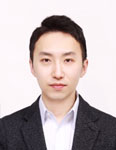교수진 소개

- Name
- Chungyong HAN, Ph.D..
- Faculty Appointment
(title, department)
- Associate Professor, Department of Cancer Biomedical Science, NCC-GCSP
Senior Scientist, Division of Tumor Immunology, Research Institute, National Cancer Center
- Area of Expertise
- T cell immunology
Cancer immunotherapy
Gene-engineered T cell therapeutics
- E-mail
- chungyong.han@ncc.re.kr
- Work Experience
- Senior Scientist, Division of Tumor Immunology, Research Institute, National Cancer Center, Goyang, Korea (2019-present)
Project Research Scientist, Division of Tumor Immunology, Research Institute, National Cancer Center, Goyang, Korea (2016-2019)
Technical Research Personnel (military service), Tumor Immunology Branch, Research Institute, National Cancer Center, Goyang, Korea (2013-2016)
- Educational Background
- Ph.D., Department of Medical Genome Sciences, Graduate School of Frontier Sciences, The University of Tokyo (2010-2013)
M.E., Department of Chemistry and Biotechnology, Graduate School of Engineering, The University of Tokyo (2008-2010)
B.E., Department of Chemistry and Biotechnology, College of Engineering, The University of Tokyo (2004-2008)
- Research Interests
- Dr. Han is interested in T cell immunity in cancer and infectious diseases. His recent research activities focus on cancer immunotherapy using T cells engineered with chimeric antigen receptors and T cell receptors.
- International Collaboration
- Hiroshi Ueda, Ph.D., Tokyo Institute of Technology, Japan
Ai Kawana-TachiKawa, Ph.D., The National Institute of Infectious Diseases, Japan
Hiroyuki Kishi, Ph.D., University of Toyama, Japan
- Achievements
- Choi BK, Kim SH, Kim YH, Lee DG, Oh HS, Han C, Kim YI, Jeon Y, Lee H, Kwon BS. RELT negatively regulates the early phase of the T-cell response in mice. (2018) Eur J Immunol 48(10):1739-1749
Han C, Sim SJ, Kim SH, Singh R, Hwang S, Kim YI, Park SH, Kim KH, Lee DG, Oh HS, Lee S, Kim YH, Choi BK, Kwon BS. Desensitized chimeric antigen receptor T cells selectively recognize target cells with enhanced antigen expression. (2018) Nat Commun 9(1):468
Han C, Kwon BS. Chimeric antigen receptor T cell therapy for cancer: a basic research-oriented perspective. (2018) Immunotherapy 10(3):221-234
Kim KH, Choi BK, Kim YH, Han C, Oh HS, Lee DG, Kwon BS. Extracellular stimulation of VSIG4/complement receptor Ig suppresses intracellular bacterial infection by inducing autophagy. (2016) Autophagy 12(9):1647-59
Choi BK, Lee DY, Lee DG, Kim YH, Kim SH, Oh HS, Han C, Kwon BS. 4-1BB signaling activates glucose and fatty acid metabolism to enhance CD8+ T cell proliferation. (2016) Cell Mol Immunol 14(9):748-757
Katoh J, Kawana-Tachikawa A, Shimizu A, Zhu D, Han C, Nakamura H, Koga M, Kikuchi T, Adachi E, Koibuchi T, Gao GF, Brumme ZL, Iwamoto A. Rapid HIV-1 Disease Progression in Individuals Infected with a Virus Adapted to Its Host Population. (2016) PLoS One 11(3):e0150397
Han C, Kawana-Tachikawa A, Shimizu A, Zhu D, Nakamura H, Adachi E, Kikuchi T, Koga M, Koibuchi T, Gao GF, Sato Y, Yamagata A, Martin E, Fukai S, Brumme ZL, Iwamoto A. Switching and emergence of CTL epitopes in HIV-1 infection. (2014) Retrovirology 11(1):38
Shimizu A, Kawana-Tachikawa A, Yamagata A, Han C, Zhu D, Sato Y, Nakamura H, Koibuchi T, Carlson J, Martin E, Brumme CJ, Shi Y, Gao GF, Brumme ZL, Fukai S, Iwamoto A. Structure of TCR and antigen complexes at an immunodominant CTL epitope in HIV-1 infection. (2013) Sci Rep 3:3097
Han C, Ihara M, Ueda H. Expression of an antibody–enzyme complex by the L–chain fusion method. (2013) J Biosci Bioeng 116(1):17-21
